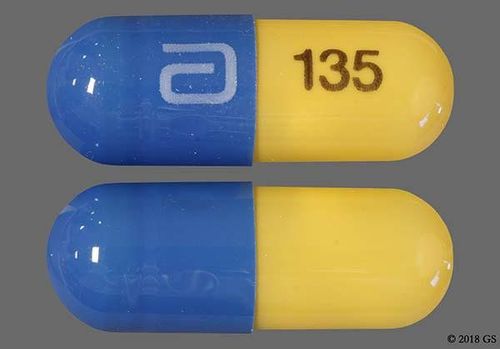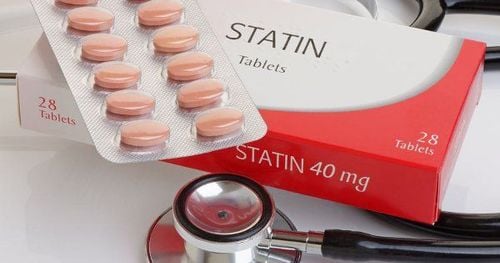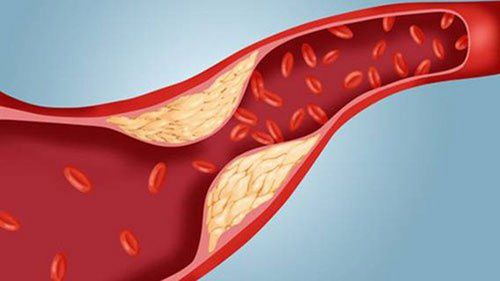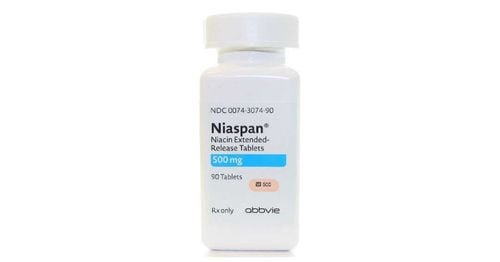This is an automatically translated article.
Sunflower seeds are a common ingredient used in nut and dried fruit mixes, whole grain breads, nutrition bars, or ready-to-eat. Sunflower seeds contain large amounts of good fats, beneficial plant compounds, vitamins and minerals. These nutrients play an important role in reducing the risk of health problems, including heart disease and type 2 diabetes.1. What are sunflower seeds?
Sunflower seeds are the fruit of the sunflower plant, harvested from large sunflower heads with a diameter of 30.5 cm. One such flower head can hold up to 2000 sunflower seeds. There are two main types of sunflower seeds, one is grown for its edible seeds, the other is grown for its oil.
Sunflower seeds for direct consumption have an inedible black and white striped shell, the seeds of oil crops have a black hard shell. Sunflower seeds have a mild flavor, intense natural nut flavor, and a soft but firm texture. They are often baked for flavor, and some are sold unprocessed.
2. Nutritional content
A sunflower seed is small but contains a large amount of nutrients. Key nutrients in a 30-gram serving of toasted sunflower seeds include:
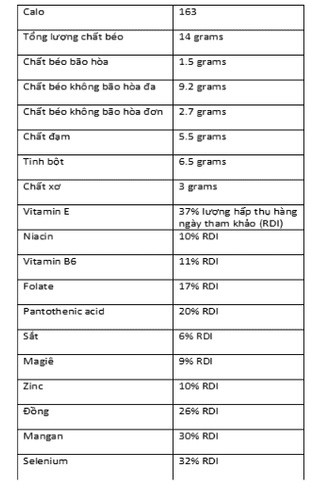
Hàm lượng dinh dưỡng
Sunflower seeds are especially rich in Vitamin E and Selenium. They function as antioxidants to protect the body from damage caused by free radicals that lead to chronic diseases. In addition, sunflower seeds are a beneficial plant compound, including phenolic acids and flavonoids that also have antioxidant functions.
When sunflower seeds sprout, plant compounds increase, while reducing agents that interfere with mineral absorption. Sunflower seeds or dried sunflower seeds can be found online or in stores.
3. Health benefits of eating sunflower seeds
Sunflower seeds can help lower blood pressure, cholesterol and blood sugar because they contain large amounts of Vitamin E, Magnesium, protein, linoleic fatty acids and several other plant compounds. Besides, studies also show a number of other benefits from sunflower seeds:
3.1 Anti-inflammatory While short-term inflammation is usually just the body's natural immune response, long-term inflammation is the risk of developing many chronic diseases. For example, high levels of C-reactive protein in the blood increase the risk of heart disease and type 2 diabetes.
In several studies of over 6000 adults who ate sunflower seeds and other nuts at least five times a week had 32% lower blood levels of C-reactive protein than those who didn't eat nuts. Although this research is not enough to conclude cause and effect, however, Vitamin E found in sunflower seeds is believed to have the ability to reduce the amount of C-reactive protein. Flavonoids and other plant compounds found in seeds Sunflower also reduces inflammation.
3.2 Reduce the risk of heart disease High blood pressure is a major risk factor for heart disease such as heart attack and stroke. Sunflower seeds contain compounds that inhibit an enzyme that causes blood vessel constriction. Therefore, eating sunflower seeds helps blood vessels relax and lower blood pressure. The magnesium in sunflower seeds also has the same effect.
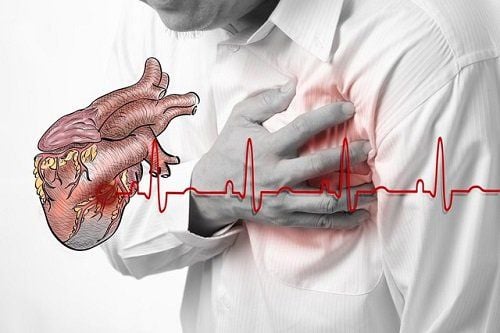
Hạt hướng dương làm giảm nguy cơ bệnh tim
Similarly, sunflower seeds are rich in fatty acids, especially linoleic acid. The body uses this acid to create a hormone-mimicking compound that relaxes blood vessels to help lower blood pressure and also helps lower cholesterol.
In a 3-week study, women with type 2 diabetes who consumed 30 grams of sunflower seeds per day in their diet had a 5% reduction in systolic blood pressure. These women also saw significant reductions in LDL cholesterol and triglycerides by 9% and 12% respectively. What's more, 13 studies show that people with high linoleic acid intake have up to 15% less risk of cardiovascular disease and 21% less likely to die from a heart attack than those with a high linoleic acid intake. has a low consumption of linoleic acid.
3.3 Reduces Risk of Diabetes The effects of sunflower seeds on blood sugar and type 2 diabetes have been tested in a few studies with promising results, but to conclude a real effect Medical science needs more research.
Studies suggest that a person who eats 30 grams of sunflower seeds daily as part of a healthy diet can reduce blood sugar levels by 10% within 6 months. The blood sugar-lowering effects of sunflower seeds may come from the plant compound chlorogenic acid.
Studies also show that adding sunflower seeds to foods like bread can help reduce the amount of sugar the body absorbs from starch. The protein and fat in nuts can slow the body's rate of stomach emptying and allow for the gradual release of absorbed sugars from starches.
4. Some potential harms from sunflower seeds

Trường hợp tiêu thụ một lượng lớn hạt hướng dương có thể gây tổn thương và các bệnh ở thận
Although sunflower seeds are said to be very healthy and full of nutrients, they can also have downsides if used incorrectly.
4.1 Calorie overload and salt consumption Despite being rich in nutrients, sunflower seeds are also very high in calories. Using sunflower seeds with their skins on and taking the time to bite off the shells is one way to reduce the speed of eating and the number of calories consumed per snack.
However, the shell of a sunflower seed is usually coated with about 2500 mg of salt, so when consumers bite the seeds with their mouth to remove the shell, they will accidentally consume about 30 grams of salt into the body. This is something that should be kept in mind for some consumers whose diets need to limit their salt intake.
When shopping for sunflower seeds outside, the salt content of the seed coat may not be as clearly listed as the nutritional value of the edible seed. Some brands also offer reduced salt products.
4.2 Sunflower Seed Heavy Metallic Like other foods, consuming moderate amounts of sunflower seeds is important because of their heavy metal properties. Consuming large amounts of heavy metals can cause damage and disease in the kidneys.
Sunflower plants tend to draw heavy metals from the tangled soil into their seeds, so sunflower seeds contain a slightly higher proportion of heavy metals than other foods.
World Health Organization WHO recommends that the weekly heavy metal consumption should stop at 490 micrograms for a 70kg adult body. When a person consumed 255 grams of sunflower seeds per week for a year, their average expected heavy metal intake increased from 65mcg to 175 mcg per week. This means that the amount of consumption mentioned above does not adversely affect the kidneys and does not increase metal levels in the blood.
Therefore, about 30 grams of sunflower seeds a day is a reasonable serving.
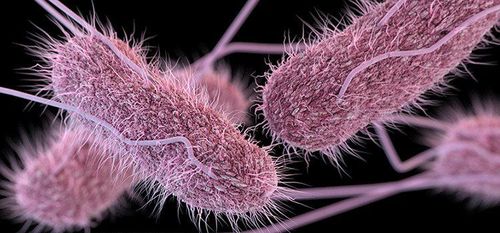
hạt hướng dương khi không được làm nóng nhiệt độ trên 48 độ C có thể tồn tại vi khuẩn
4.3 Sprouted Sunflower Seeds Germinated seeds are ideal conditions for the growth of harmful bacteria such as Salmonella because the seed environment is moist and warm. This is a special note when using sunflower seed sprouts.
Some seeds, when not heated according to the process with a temperature above 48 degrees Celsius, will have the ability to harbor harmful bacteria. Therefore, the process of drying sunflower seeds at high temperatures before being marketed helps to kill bacteria. One study found that drying sunflower seeds at 50 degrees Celsius significantly reduced the occurrence of Salmonella bacteria.
4.4 Risk of Allergic Reactions to the Body Although in fact there are not many cases of sunflower seed allergy, there have been reported cases of reactions such as asthma, mouth swelling, itchy mouth, fever. , skin rash, lesions, vomiting and anaphylaxis. The proteins in sunflower seeds are known to cause irritation, so eating sunflower seeds or other products like avocado or ground sunflower seeds is equally likely to cause an allergic reaction. Refined sunflower oil is the product with the least amount of allergenic proteins.
4.5 Constipation Risk Eating large amounts of sunflower seeds at once has the potential to lead to stool loss or obstruction in both children and adults. Besides constipation, eating an unreasonable amount of sunflower seeds or eating the seed shells can cause abdominal pain and nausea.
Please dial HOTLINE for more information or register for an appointment HERE. Download MyVinmec app to make appointments faster and to manage your bookings easily.




